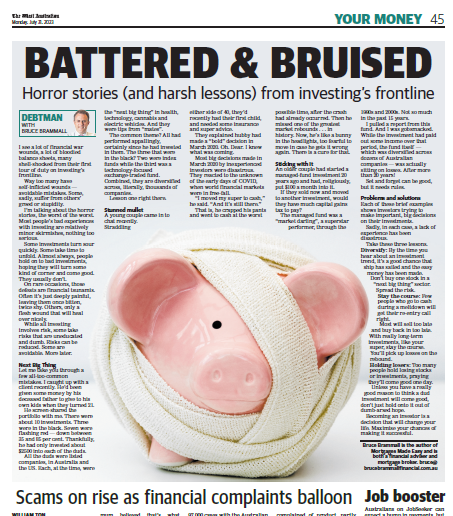
Bruce Brammall, The West Australian, 31 July, 2023
I see a lot of financial war wounds, a lot of bloodied balance sheets, many shellshocked from their first tour of duty to investing’s front line.
Way too many have self-inflicted wounds – avoidable mistakes. Some, sadly, suffer from others’ greed or stupidity.
(I’m talking about the horror stories, the worst of the worst. Most people’s bad experiences with investing are relatively minor skirmishes, nothing too serious.)
Some investments turn sour quickly. Some take time to unfold. Almost always, people hold on to bad investments, hoping they will turn some kind of corner and come good. They usually don’t.
On rare occasions, those defeats are financial tsunamis. Often it’s just deeply painful, leaving them once-bitten, twice shy. Others, only a flesh wound that will heal over nicely.
While all investing involves risk, some take risks that are uneducated and dumb. Risks can be reduced. Some are avoidable. More later.
Next Big Thing
Let me take you through a few all-too-common mistakes.
I caught up with a client recently. He’d been given some money by his deceased father to give to his own kids when they turned 21.
He screen-shared the portfolio with me. There were about 10 investments. Three were in the black. Seven were flashing red – down between 35 and 85 per cent. Thankfully, he had only invested about $2500 into each of the duds.
All the duds were listed companies, in Australia and the US. Each, at the time, were the “next big thing” in health, technology, cannabis and electric vehicles. And were tips from “mates”.
The common theme? All had performed appallingly, certainly since he had invested in them.
The three that were in the black? Two were index funds, while the third was a technology-focussed exchange-traded funds (ETFs). Combined, they are diversified across, literally, thousands of companies.
Lesson one right there.
Stunned mullet
Young couple came in to chat recently. Straddling either side of 40, they’d recently had their first child, and needed some insurance and super advice.
They explained hubby had made a “bold” decision in March 2020.
Oh. Dear. I knew what was coming.
Most big decisions made in March 2020 by inexperienced investors were disastrous. They reacted to the unknown of the early days of Covid, when world financial markets were in free-fall.
“I moved my super to cash,” he said. “And it’s still there.”
That is, he crapped his pants and went to cash at the worst possible time, after the crash had already occurred. Then missed one of the greatest market rebounds … in history. Now, he’s like a bunny in the headlights, too fearful to move in case he gets it wrong again.
There is a cure for that.
Sticking with it
An older couple had started a managed-fund investment 20 years ago and had, religiously, put $100 a month into it. If they sold now and moved to another investment, would they have much capital gains tax to pay?
The managed fund was a “market darling”, a superstar performer, through the 90s and 00s. Not so much in .. the last 15 years.
I pulled a report from this fund. And I was gobsmacked. While the investment had paid out some income over that period, the fund itself, which was diversified across dozens of Australian companies, was actually sitting on losses. After more than 20 years!
Set and forget can be good, but it needs rules.
Problems and solutions
Each of these brief examples shows investors trying to make important big decisions on their investments.
Sadly, in each case, a lack of experience has been disastrous.
Take these three lessons.
Diversify: By the time you hear about an investment trend, good chance that ship has sailed and the easy money has been made. Don’t buy one stock in a “next big thing” sector. Spread the risk.
Stay the course: Few people who go to cash during a meltdown will get their re-entry call right. Most will sell too late and buy back in too late. With really long-term investments, like your super, stay the course. You’ll pick up losses on the rebound.
Holding losers: Too many people hold losing stocks/investments, praying they’ll come good one day.. Unless you have really good reason to think a dud investment will come good, don’t just hold onto it out of dumb-arsed hope.
Becoming an investor is a decision that will change your life. Maximise your chances of making it successful.
Bruce Brammall is the author of Mortgages Made Easy and is both a financial adviser and mortgage broker. E: bruce@brucebrammallfinancial.com.au.
